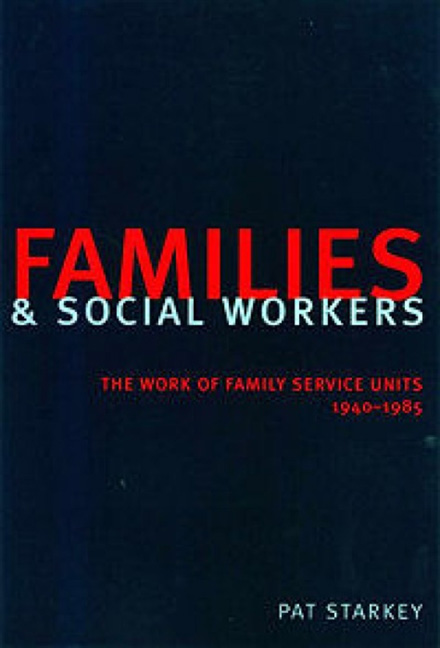Book contents
- Frontmatter
- Contents
- Acronyms and abbreviations
- Introduction
- 1 Pacifist Service
- 2 Problem Families, Eugenics and FSU
- 3 The Growth of a Social Work Agency
- 4 Changes and Adjustments
- 5 Training and Professional Development
- 6 Changing Relationships with the State
- 7 Almost Not An Organisation
- Conclusion
- Bibliography
- Index
4 - Changes and Adjustments
- Frontmatter
- Contents
- Acronyms and abbreviations
- Introduction
- 1 Pacifist Service
- 2 Problem Families, Eugenics and FSU
- 3 The Growth of a Social Work Agency
- 4 Changes and Adjustments
- 5 Training and Professional Development
- 6 Changing Relationships with the State
- 7 Almost Not An Organisation
- Conclusion
- Bibliography
- Index
Summary
The approbation and endorsement which the agency had attracted during the 1940s and 1950s continued into the following decade and beyond. In spite of debates about the relative merits of different forms of intervention within both the social work profession generally and the organisation itself, FSU remained associated with intensive family casework. By stressing the importance of the whole family group, and of the child within the family, FSU even influenced the work of the voluntary agencies which had traditionally been associated with child rescue and the institutional care of children from families in which their well-being was thought to be threatened. For instance, it formed the basis of small-scale experiments like First Aid for Families, practised by National Children's Homes and explicitly based on FSU's example.
FSU was also singled out for praise by a Home Office Committee on Children and Young Persons which had been set up in 1956 under the chairmanship of Viscount Ingleby, and which reported in 1961. One commentator claimed that the report contained a ‘plea for a rationalised and huge extension of the pioneer work done by Family Service Units’. He was in a position to know; as a magistrate and a former chairman of the London County Council Children's Committee, Donald Ford had been a member of the Ingleby committee. However, his exultant comment appears to have been based on slim evidence and a partial reading of the report. The committee's terms of reference had been to inquire into the working of the law in England and Wales, specifically the juvenile court system and its jurisdiction and procedures, together with the remand home and approved school systems. The greater part of the report, therefore, is concerned with the prevention and treatment of juvenile delinquency, which was reported to have increased by 47 per cent since 1954. While the sort of family rehabilitation in which FSUs were involved had some bearing on the incidence of delinquency, it requires a good deal of imagination to see in the 125 Ingleby recommendations an encouragement to extend its work considerably. The committee was also required to inquire into, and make recommendations on, local authorities’ powers and duties in order to prevent or forestall the suffering of children through neglect in their own homes, but it was secondary to the main purpose of the report.
- Type
- Chapter
- Information
- Families and Social WorkersThe Work of Family Service Units 1940–1985, pp. 98 - 140Publisher: Liverpool University PressPrint publication year: 2000



